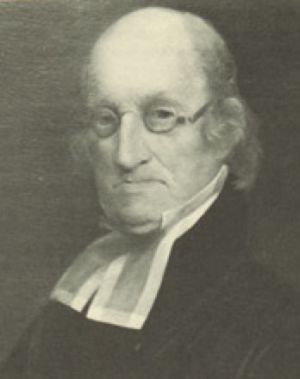Ezra Ripley
Overview[edit]
[1] (May 1, 1751 – September 21, 1841) was an influential Unitarian minister and community leader in Concord, Massachusetts. He was also a dedicated Freemason, initiated in 1798 and serving as Lodge Secretary and, later, Grand Chaplain of the Grand Lodge of Massachusetts.
Early Life[edit]
Born in Woodstock, Connecticut, Ezra Ripley was the fifth of nineteen children of Noah and Lydia (Kent) Ripley. His family lineage traced back to early settlers in Hingham, Massachusetts. Though he initially worked on the family farm, his father eventually sought an education for Ezra, hoping he would teach grammar school. Under the mentorship of Rev. Dr. Forbes, Ripley prepared for higher education while supporting himself through labor. His passion for learning and desire to preach led him to Harvard University in 1772, although the Revolutionary War disrupted his studies. Ripley graduated in 1776 alongside notable classmates, including Christopher Gore and Samuel Sewall.
Ministry in Concord[edit]
In 1778, Ripley became the minister of the First Parish in Concord, succeeding Rev. William Emerson, the grandfather of Ralph Waldo Emerson. He married Emerson's widow, Phebe Bliss Emerson, and resided at “The Old Manse,” where he served the parish for over six decades. Initially an Arminian, Ripley became a Unitarian and, in 1825, saw the formation of a separate Trinitarian Congregationalist society, a schism that saddened him deeply.
In 1830, Ripley was joined by Rev. Hersey B. Goodwin as a colleague and later by Rev. Barzillai Frost. Even as he aged, Ripley continued his pastoral duties, attending his 60th Harvard reunion in 1836 and participating in parish life until his passing.
Masonic Contributions[edit]
Ezra Ripley was initiated into Masonry in 1798 and served as Secretary of the Concord Lodge in 1800–1801. Though elected to higher offices, he declined them, preferring active participation at the Lodge meetings. In 1821, he was made an honorary member, and in 1803, 1831, 1832, and 1833, he was appointed Grand Chaplain of the Grand Lodge of Massachusetts. He delivered Masonic addresses and supported the Institution passionately, viewing it as second only to church and state.
Legacy and Influence[edit]
Ripley was highly respected for his moral integrity, intellectual sharpness, and unwavering dedication to his parish and community. His benevolence, humor, and strength of character made him a local icon whose memory endured long after his death. Known for his engaging storytelling and compassionate service, Ripley left an enduring legacy in Concord’s history and within the Masonic community. His descendants, including his son Samuel and his grandsons, continued the Masonic tradition, honoring the Ripley name within the Lodge.
In the community, Ripley was seen as a king-like figure in his parish, exercising authority with a mixture of compassion, discipline, and humility. While he lived to witness social changes, including the rise of Transcendentalism, Ripley remained steadfast in his convictions until his death.
- ↑ Surette, Luis A., The By-Laws of Corinthian Lodge, Benjamin Tolman, 1859
